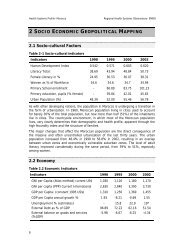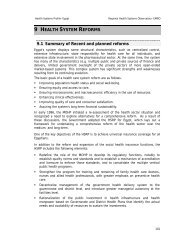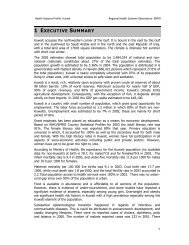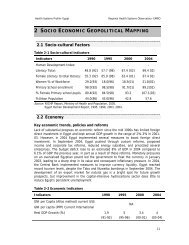The role of contractual arrangements in improving health sector ...
The role of contractual arrangements in improving health sector ...
The role of contractual arrangements in improving health sector ...
You also want an ePaper? Increase the reach of your titles
YUMPU automatically turns print PDFs into web optimized ePapers that Google loves.
Expected risks and <strong>in</strong>centives<br />
M<strong>in</strong>istry <strong>of</strong> Health<br />
Risks<br />
Jordan<br />
• <strong>The</strong> amount <strong>of</strong> f<strong>in</strong>ancial claims from contracted hospitals may exceed the amount<br />
allocated <strong>in</strong> HID budget.<br />
• <strong>The</strong> tendency <strong>of</strong> the private hospitals to provide unnecessary or low quality <strong>health</strong><br />
services to maximize revenues.<br />
• Some private qualified providers may be reluctant to participate <strong>in</strong> the contract<strong>in</strong>g<br />
process due to anxiety over work<strong>in</strong>g with the public <strong>sector</strong>.<br />
• <strong>The</strong>re is a possibility that private providers may change their behaviour and give<br />
priority to private patients. This may create long wait<strong>in</strong>g lists and <strong>in</strong>crease<br />
wait<strong>in</strong>g time for the M<strong>in</strong>istry <strong>of</strong> Health patients.<br />
• <strong>The</strong>re is a possibility that some political parties may misunderstand the objectives<br />
<strong>of</strong> the government from contract<strong>in</strong>g. <strong>The</strong>y may consider contract<strong>in</strong>g as a way <strong>of</strong><br />
“privatiz<strong>in</strong>g” <strong>health</strong> care and allow<strong>in</strong>g government to avoid its responsibilities to<br />
provide services for the poor.<br />
Incentives<br />
• Improves accessibility for the M<strong>in</strong>istry <strong>of</strong> Health beneficiaries and poor patients.<br />
• Decreases pressure on and over-utilization <strong>of</strong> M<strong>in</strong>istry <strong>of</strong> Health facilities,<br />
especially <strong>in</strong> Amman.<br />
• Optimizes the utilization <strong>of</strong> <strong>health</strong> care resources <strong>in</strong> the country.<br />
• Could provide, if well negotiated and managed, better quality services with less<br />
cost.<br />
• Builds skills and experience <strong>in</strong> negotiation, preparation, management, monitor<strong>in</strong>g<br />
and evaluation <strong>of</strong> contracts.<br />
Private <strong>sector</strong><br />
Risks<br />
• Delay <strong>in</strong> accounts settlement due to bureaucratic procedures or shortage <strong>of</strong><br />
budget allocations.<br />
• Due to competition, discounted contract prices may not be economically feasible.<br />
• Abrupt changes <strong>in</strong> government directions could <strong>in</strong>cur f<strong>in</strong>ancial loss for private<br />
hospitals.<br />
Incentives<br />
• Increas<strong>in</strong>g bed occupancy rates and revenues.<br />
• Acquir<strong>in</strong>g public f<strong>in</strong>anc<strong>in</strong>g and cash flow.<br />
• Improv<strong>in</strong>g the competitive position <strong>of</strong> the hospital.<br />
123
















